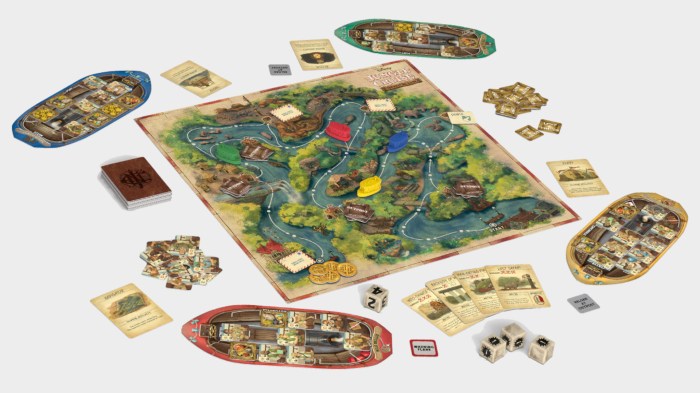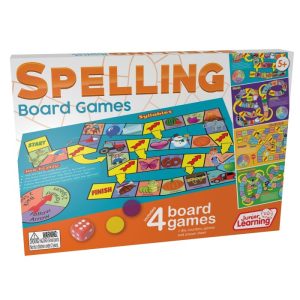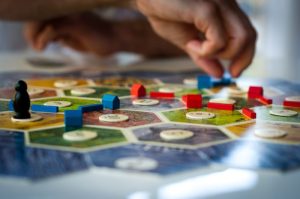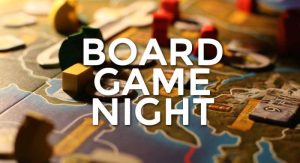
Step into the world of board games for families, where fun and connection intertwine, creating cherished memories and joyful moments. From timeless classics to innovative modern games, the journey of family game nights is filled with laughter and learning.
Introduction to Board Games

Board games have been a popular form of entertainment for families for centuries, providing a fun and engaging way to spend quality time together. The appeal of board games lies in their ability to bring people together, promote social interaction, and create lasting memories.
History of Board Games
Board games have a rich history dating back thousands of years, with some of the earliest known games originating in ancient civilizations such as Egypt and Mesopotamia. Over time, board games have evolved and diversified, with new games continuously being developed to cater to different interests and preferences.
Benefits of Playing Board Games as a Family
- Encourages bonding and communication: Board games provide an opportunity for families to bond, communicate, and work together towards a common goal.
- Promotes critical thinking and problem-solving skills: Playing board games requires strategic thinking, decision-making, and problem-solving, which can help improve cognitive abilities.
- Teaches important life skills: Board games teach valuable lessons such as patience, sportsmanship, and planning ahead, which are essential for personal development.
- Provides a break from screens: In a world dominated by technology, board games offer a screen-free alternative that allows families to disconnect and engage in meaningful interactions.
Popular Board Games for Families
Board games have always been a great way for families to come together and have fun. Whether it’s a classic game that has been around for generations or a modern favorite, playing board games can create lasting memories and strengthen bonds between family members.
Classic Board Games
Classic board games are timeless favorites that have been enjoyed by families for years. These games are easy to learn, fun to play, and are suitable for all ages. Some popular classic board games for families include:
- Monopoly: A classic game of buying, selling, and trading properties to become the wealthiest player.
- Scrabble: A word game where players create words using letter tiles to earn points.
- Clue: A mystery game where players must solve a murder by gathering clues and making deductions.
Modern Board Games
Modern board games have gained popularity in recent years, offering unique gameplay mechanics and themes that appeal to families. These games often require strategic thinking and creativity, providing a fresh experience for players. Some popular modern board games for families include:
- Ticket to Ride: A railway-themed game where players collect train cards and build routes to connect cities.
- Catan: A resource management game where players trade and build settlements on an island.
- Carcassonne: A tile-laying game where players strategically place tiles to build cities, roads, and fields.
Cooperative Board Games
Cooperative board games are a great way for families to work together towards a common goal, promoting teamwork and communication. In these games, players must collaborate to overcome challenges and achieve victory as a team. Some examples of cooperative board games that families can enjoy include:
- Pandemic: A game where players work together to stop the spread of diseases and save the world.
- Forbidden Island: A treasure-hunting adventure where players must work together to escape a sinking island.
- Flash Point: Fire Rescue: A game where players become firefighters working together to rescue people from a burning building.
Factors to Consider When Choosing Board Games
When selecting board games for family game nights, it’s essential to consider various factors to ensure everyone has a great time and stays engaged throughout the gameplay.
Selecting Games Based on Age Groups
- Young Children: Opt for games that are easy to learn and have simple rules to keep them interested and excited.
- Teenagers: Choose games that offer strategic challenges and require critical thinking to appeal to their growing cognitive abilities.
- Adults: Look for games that offer a mix of strategy and social interaction to keep everyone engaged and entertained.
Importance of Game Complexity and Duration
- Complexity: Consider the complexity of the game based on the age and experience level of the players. Too simple or too complex games might lead to disinterest.
- Duration: Choose games with appropriate playing time to fit within the family’s schedule. Short games for quick play sessions or longer games for dedicated game nights.
Catering to Different Interests and Preferences
- Theme: Select games with themes that appeal to everyone in the family, whether it’s fantasy, mystery, strategy, or trivia.
- Game Type: Take into account the preferred game types such as cooperative, competitive, party, or strategy games to ensure everyone enjoys the gameplay.
- Player Count: Check the player count on the game box to ensure it accommodates the number of players in your family for optimal participation.
Benefits of Playing Board Games as a Family
Playing board games as a family offers a multitude of benefits that go beyond just having fun together. It provides an opportunity for bonding, communication, and skill development in a wholesome and enjoyable way.
Social and Cognitive Benefits
Playing board games together can improve social interactions among family members. It encourages teamwork, cooperation, and healthy competition. Moreover, it enhances cognitive skills such as critical thinking, problem-solving, decision-making, and strategic planning. By engaging in these mental exercises, family members can sharpen their minds and stay mentally active.
Strengthening Family Bonds and Communication
Board games create a platform for spending quality time with loved ones, fostering stronger relationships, and creating lasting memories. The shared experience of playing together can strengthen family bonds by promoting laughter, camaraderie, and mutual understanding. Communication skills are also enhanced as family members engage in discussions, negotiations, and friendly banter during gameplay.
Educational Value
Many board games are designed to be educational, offering opportunities for learning various skills in a fun and engaging manner. From math and vocabulary to geography and history, board games can help children and adults alike expand their knowledge base. Additionally, these games promote strategic thinking, problem-solving abilities, and adaptability, which are essential life skills that can be applied beyond the gaming table.
Organizing a Family Game Night

Planning a family game night can be a fun and exciting way to bond with your loved ones and create lasting memories together. It provides an opportunity for everyone to disconnect from screens and devices and engage in some quality time together. Here is a step-by-step guide on how to plan a successful family game night:
Create a Welcoming Environment
To ensure that everyone feels comfortable and excited about game night, set the stage by creating a welcoming environment. Clear a space in your home where everyone can gather comfortably, whether it’s the living room, dining table, or even outdoors. Dim the lights, play some background music, and consider lighting candles or setting up fairy lights to add to the cozy atmosphere.
Choose Games for Everyone
When selecting games for the night, make sure to choose a variety that caters to the interests and skill levels of all family members. Consider including both classic board games like Monopoly or Scrabble and newer, more modern games like Codenames or Ticket to Ride. This way, everyone will have a chance to play something they enjoy.
Set the Rules and Schedule
Before starting the games, take some time to explain the rules to everyone and set a schedule for the evening. Make sure to allocate enough time for each game so that no one feels rushed or left out. Consider rotating players or teams to keep things interesting and allow everyone to participate.
Provide Snacks and Refreshments
No game night is complete without snacks and refreshments. Consider setting up a snack bar with a variety of treats like popcorn, chips, cookies, and drinks. Encourage everyone to help themselves throughout the night to keep their energy levels up and spirits high.
Celebrate the Winners
At the end of the night, be sure to celebrate the winners of each game with a small prize or special recognition. This will add an element of friendly competition and make the night even more memorable for everyone involved.
Closure
As we wrap up our exploration of board games for families, remember that these games are not just about entertainment but also about building stronger relationships and fostering valuable skills. So gather your loved ones, roll the dice, and let the games begin for endless hours of bonding and fun!
Frequently Asked Questions
How do board games benefit family bonding?
Board games encourage communication, teamwork, and quality time spent together, strengthening the bonds between family members.
What are some tips for choosing board games for different age groups?
Consider the complexity of rules, themes, and game duration to ensure everyone in the family can participate and enjoy the game night.
Why are cooperative board games recommended for families?
Cooperative games promote collaboration and mutual support among players, fostering a sense of unity and shared victory.





